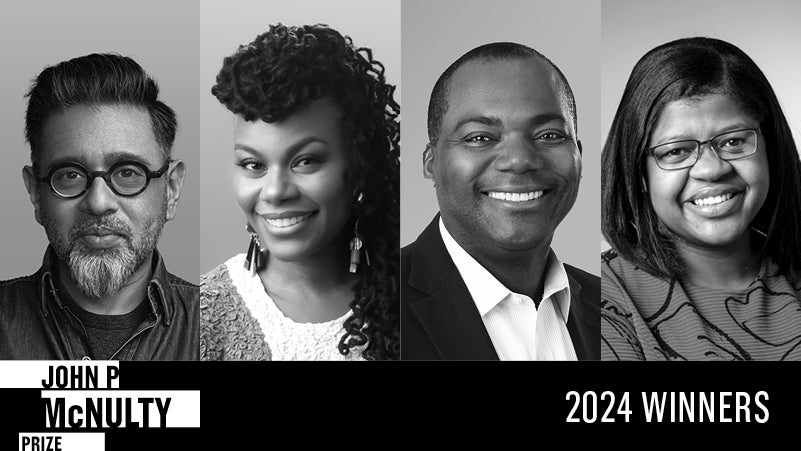Sen. Reverend Raphael Warnock, an Aspen Institute Ascend Fellow, and Jonathan Eig, author of “King: A Life”, In Conversation with Anne Mosle, Aspen Institute Vice President
In honor of the Martin Luther King, Jr. holiday, Anne Mosle, Vice President at the Aspen Institute, hosted the first in a new series of conversations with leaders and thinkers. Joined by United States Sen. Reverend Raphael Warnock of Georgia and Jonathan Eig, author of the best-selling biography, “King: A Life,” Mosle explored connections between values, leadership, and social impact. “What lessons of the past can guide us to ensure prosperity and well-being pass from generation to generation,” Mosle asked. “How can we create a world – one Dr. King imagined in his lifetime – where all children and families are respected, valued, and encouraged to achieve their dreams?”
Senator Warnock was first elected to the US Senate in a special runoff election in January 2021 and reelected in January 2023. For over 16 years, he has served as Senior Pastor at Ebenezer Baptist Church in Atlanta, Georgia, the former pulpit of Rev. Dr. Martin Luther King, Jr. Along with Eig and Mosle, Warnock explored how faith drove King and how it remains critical to social change and moral leadership.
Warnock connected his faith-driven work with his moral imperatives as an elected leader, reflecting on his tenure as senior pastor and making sure that spirituality wasn’t just a feel-good exercise done on Sundays, but that it should inspire action outside of worship.
“It’s something that I said when I launched my campaign… I’ve never believed that faith stops at the church door. That’s where it starts, and it ought to come alive in the work that we do and the public policy that we try to advance and the struggles that we get engaged in.”
Dr. King was a foundational influence on Warnock and continues to inspire him today. “He absolutely captured my attention,” said Warnock. “His ability to motivate people, who then put those words into practice – how he laid his body on the line and inspired others to do it – I said, that’s what I want to do with my life. The ways in which he used his faith not as a weapon but as a bridge – that’s inspired me my entire life.”
That faith is also what drives Warnock’s leadership and work today. “Even in these difficult times, I feel incredibly blessed,” said Warnock. “I get to preach about equality on Sunday and then write laws with colleagues on Monday.”
Warnock also noted how critical it is to understand the full picture of Dr. King’s advocacy and legacy. When we remember Robert Walker and Echol Cole, who were crushed to death and whose blood summoned Dr. King to Memphis – the fateful trip where he was assassinated – we recognize how many are still suffering, and for whom the work must continue.
There’s a way in which we tell ourselves a simple story about the movement: that there was segregation, Dr. King had a dream, everybody got it, and now we’ve lived happily ever after. And it’s much more complicated than that. We’re in the midst of a huge backlash right now from those who want to erase this history. This is why this kind of work and research is so important – so that we remain vigilant in doing the work to which he committed his life.”
As the conversation continued, Eig shared insights from his six-plus years of research for his book profiling Dr. King, including the ways in which the full story of his life means knowing him not just as a figurehead but an imperfect human being. “…to take him out of that stone monument and make him flesh for readers again. Eig explained, “I wanted to write a book…that showed the true radical and the real man.”
“King didn’t seek to be the leader of a movement, but it became an extension of his ministry, feeling that he had to get involved,” said Eig. “The man becomes the leader not because he had ambitions to lead or wanted power, but because he was moved by his faith.”
In leading the discussion on King, Mosle focused on the abundance of leadership potential in all of us. She emphasized the need to “create the conditions” to make sure those leadership qualities are “seen, lifted up, and poured into,” an imperative to honor the lived experiences of the people and communities we seek to serve. Mosle also connected King’s work to the social impact efforts that everyday people and organizations like the Aspen Institute are engaged in today:
“Change happens every day, it happens in small ways, it often happens when nobody is looking – sometimes those are the most powerful changes. But each act, each intention, each solution adds up. We need to lead and live our principles and our purpose and recognize our power that we each have. Lead with that bigger sense. It helps some of the weight fall away and also feel more connected. Because we can only get through it together.”
Watch the full conversation below.

